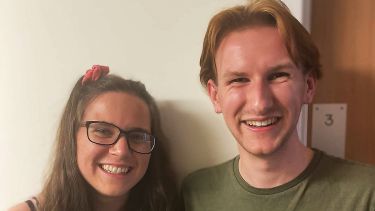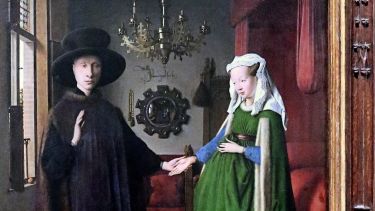Alice: "It has been a difficult year, but our Low Countries Culture and Society module Born out of Revolt and Consensus has definitely been a good experience. Going into it I knew next to nothing about Dutch and Flemish culture or history, so it’s certainly been interesting to learn how the Low Countries became Belgium and The Netherlands."
Theo: "I agree, I think focusing not just on history but also on visual art and architecture and how that plays into the construction of national identities has provided an interesting insight as opposed to the traditional view of history which is usually just an overview of wars and royals."
Alice: "Also the way Filip De Ceuster teaches the module makes it so enjoyable – when someone’s passionate about something then it’s always more interesting to hear about."
Any aspects you enjoyed in particular?
Theo: "I think for me, the main thing is a newfound enjoyment of art history and architecture. Unpicking the meaning of significant artworks from Dutch history, like the riddle that is Jan van Eyck’s Arnolfini Portrait, has been really fun. It’s something I wouldn’t have thought about studying otherwise."
We had a guest session with a popular Belgian history podcaster who gave us practical tips and tricks.
Theo Taylor
BA Dual Dutch, Spanish & Linguistics
Alice: "I had loads of fun learning about the Guldensporenslag. I love historical battles and it was such a dramatic story! No wonder it was turned into Flanders’ founding myth. I also really liked creating dating profiles for the historical figures we had covered."
Theo: "Yeah, the assessments are pretty enjoyable and even the exam in the first semester wasn’t stressful at all. This semester we are making a group podcast, which has also been good fun so far and it’s such a useful skill to have. We had a guest session with a popular Belgian history podcaster who gave us practical tips and tricks."
What struck me learning about Low Countries culture and history, actually, is how interwoven and fundamental it was to the rest of Europe.
Alice Willett
BAMLC (Dutch, German, Spanish)
Alice: "I also like that it’s a small module, it feels really close-knit and you know everyone in the lectures. What struck me learning about Low Countries culture and history, actually, is how interwoven and fundamental it was to the rest of Europe – I hadn’t considered things like the Holy Roman Empire and the link to Spain and the Habsburgs before coming to university."
Theo: "Yeah, for me an important aspect is the frank discussion we have about the darker pages in Low Countries history as well as the glorious ones; acknowledging that a period that’s incredibly prosperous and productive for one place can and does directly affect and exploit other people so drastically. From those discussions I think I have gained the ability to analyse and think more meaningfully about historical and cultural events, about how those moments define our present and our future."
Alice: "It is so important to study the history, the culture and the politics behind the language that you’re learning: languages do not exist and develop in a vacuum. It gives you the necessary context, an integrated view of the subject area."
Theo: "I agree, I think that’s a very good note to end on. Zullen we nog een kopje koffie drinken?"


